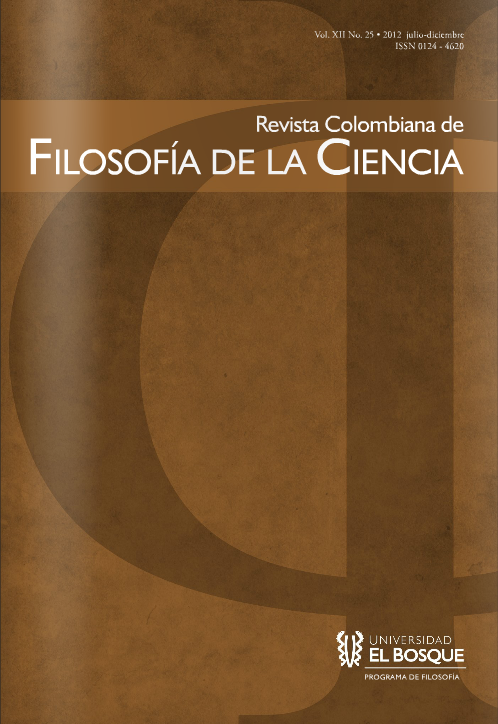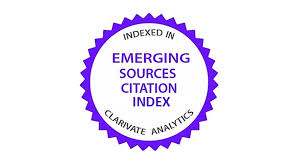Sobre el discurso tecnológico de la modernidad
DOI:
https://doi.org/10.18270/rcfc.v12i25.1657Resumen
Este escrito es un ensayo para comprender el concepto de tecnología no en el sentido
tradicional relativo al instrumento, sino en el sentido de un tipo de discurso a partir del
cual se organiza y legitima un determinado campo técnico. El ensayo comienza examinando
brevemente las tendencias en los discursos sobre la tecnología para evidenciar su
proclividad a identificarla con el campo instrumental. Esta tendencia se denominará
“tecnología imaginaria”. Posteriormente, el texto se remite a los orígenes griegos antiguos
del término para obtener allí unas notas objetivas del concepto que permitirán
interpretarlo como discurso sobre la técnica. En la siguiente sección se muestra que estas
notas siguen vigentes en los discursos modernos sobre la técnica, en relación tanto con la
ciencia como con las técnicas industriales. Esta significación nueva del término se denominará
“tecnología real”. Finalmente, el texto concluye con una explicación de cómo
pasó el término tecnología original antiguo a nombrar el campo instrumental, vía del
hiato técnico de la Revolución industrial.
Descargas
Referencias bibliográficas
Acevedo Díaz, José A. Tres Criterios para diferenciar entre Ciencia y Tecnología.
Organización de Estados Iberoamericanos. 1998. En línea. 10 de octubre
de 2011. <http://www.oei.es/salactsi/acevedo12.htm>.
Arias de Greiff, Jorge. “Un Momento Estelar en la Ingeniería Mecánica en
Colombia: Los Diseños de Locomotoras de P. C. Dewhurst. (Primera
Parte)”. Boletín Cultural y Bibliográfico BLAA. 26.21 (1989). En línea. 28 de
octubre de 2011. <http://www.lablaa.org/blaavirtual/publicacionesbanrep/
boletin/boleti5/bol21/momento.htm>.
Aristóteles. Ars Rhetorica. Ed. W. D. Ross. Oxford: Clarendon Press, 1959.
Badiou, Alain. La Ética. Ensayo Sobre la Conciencia del Mal. Trad. Raúl J.
Cerdeiras. Madrid: Herder, 2004
Beckmann, Johan. Anleitung Sur Technologie Oder zur Kentnis der Handwerke,
Fabrisen und Manufacturen. Göttingen: Bandenhoet und Ruprecht, 1802.
—. “Entwurf der Allgemeinen Technologie”. Vorrath kleiner Anmerkungen
über mancherley gelehrte Gegenstände. Göttingen, 1806. 463-533.
Bellers, John. Proposals for raising a colledge of industry of all useful trades
an husbandry, with profit for the rich, a plentiful living for the poor, and a
good education for youth : Which will be advantage to the government, by the
increase of the people, and their riches. Londres: T. Sowle, 1696. En línea. 25
de agosto de 2011. <http://onlinebooks.library.upenn.edu/webbin/book/
lookupname?key=Bellers%2C%20John%2C%201654-1725>.
Berg, Maxine, La Era de las Manufacturas 1700-1820. Una nueva historia de
la revolución industrial británica. Trad. Monserrat Iniesta. Madrid: Crítica,
Cicerón, Marco T. Epistolae ad Atticum, ad Familiares, ad QuintumFratrem,
Q. Tulli Ciceronis Commentariorum Petitionis Consulatus ad M Fratrem.
Ed. L Purser. Oxford: Clarendon Press, 1901.
Epicteto. Dissertationes ab Arriano Digestae. Ed. Heinrich Schenkl. Leipzig:
Teubner, 1916.
Habermas, Jürgen. Ciencia y Técnica Como Ideología. Trad. Manuel Jiménez
Redondo y Manuel Garrido. Madrid: Tecnos, 2005.
Heller, Agnes. Más Allá de la Justicia. Trad. Jorge Vigil. Barcelona: Crítica,
Hronszki, Imre. Algunas Observaciones Sobre la Reciente Filosofía de la Tecnología
en Europa. El Caso de Alemania. Sala de Lectura CTS+I de la OEI. En
línea. 10 de octubre de 2011. <http://www.oei.es/salactsi/teorema00.pdf>.
Kapp, Ernst. Grundlinieneiner Philosophie der Technik. Braunschweig: Druck
und Verlag von George Westermann, 1877. En línea. 8 de febrero de 2010.
The Virtual Laboratory. Max Planck Institute for the History of Science. Berlin
<http://vlp.mpiwg-berlin.mpg.de/references?id=lit39532>.
Kuhn, Thomas S. The structure of scientific revolutions. Chicago: The University
of Chicago Press., 1962. 2ª ed., aumentada y corregida. 1969.
Longino. On the Sublime. Trad. William Rhys Roberts. Cambridge (UK):
Cambridge University Press, 1907.
Marx, Karl. El Capital. Crítica de la Economía Política. Vol 1. Trad. Wenceslao
Roces, México: Fondo de Cultura Económica, 1977.
Mitcham, Karl ¿Qué es la Filosofía de la Tecnología? Trad. César Cuello Nieto
& Roberto Méndez Stingl. Barcelona: Anthropos, 1989.
Molina Londoño, Luis F. “El Ferrocarril de Amagá”. Credencial Historia 102
(1998 junio). En línea. 28 de octubre de 2011. <http://www.banrepcultural.
org/blaavirtual/revistas/credencial/junio1998/102porta.htm>.
Olesson, John. P. Ed. The Oxford Handbook of Engineering and Technology in
the Classical World. Oxford: Oxford University Press, 2008.
Orlikowski, Wanda J. “The Duality of Technology: Rethinking the Concept
of Technology in Organizations”. Organization Science 3.3 (1992): 398-247.
Petty, William. “Another Essay on Political Arithmetic, concerning the
Growth of the City of London: with the measures, periods, causes and
consequences thereof”. 1682. The Economic Writings of Sir William Petty,
together with the Observations Upon Bills of Mortality, More Probably by
Captain John Graunt. Vol II. Ed. Charles Henry Hull, Cambridge:
Cambridge University Press, 1899. En línea. 25 de agosto de 2011.
oll.libertyfund.org/title/1677>.
—. “Verbum Sapienti”. 1664. The Economic Writings of Sir William Petty,
together with the Observations Upon Bills of Mortality, More Probably by
Captain John Graunt. Ed. Charles Henry Hull. Cambridge: Cambridge
University Press, 1899. En línea. 25 de agosto de 2011. <http://oll.libertyfund.
org/title/1677>.
Plutarco. “De Garrulitate”. Moralia. Ed. Gregorius N. Bernardakis. Leipzig:
Teubner, 1891.
Quintanilla, Miguel A. Tecnología: Un Enfoque Filosófico y Otros Ensayos de
Filosofía de la Tecnología. México: Fondo de Cultura Económica, 2005.
Rossi, Paolo. Los Filósofos y las Máquinas. 1400-1700. Trad. José Manuel
García de la Mora. Barcelona: Labor, 1966.
Searle, John. R. Speech Acts. An essay in the Philosophy of Language. Cambridge:
Cambridge University Press, 1970.
Vanderlint, Jacob. Money Answers All Things. 1734. A Reprint of Economic
Tracts. Vol 3. Ed. Jacob Hollander. Baltimore: The Johns Hopkins Press,
Vega Encabo, J. “Estado de la Cuestión: Filosofía de la Tecnología”. Theoría.
An International Journal of Theory, History and Foundations of Science, 23.3
(2009): 323-341.
Vérin, Hélène. “La Technologie: Science Autonome ou Science Intermédiaire?”
Documents pour l’histoire destechniques 14 (2007): 134-143. En
línea. 25 de agosto de 2011. <http://dht.revues.org/pdf/1210>.
Descargas
Publicado
Cómo citar
Número
Sección

| Estadísticas de artículo | |
|---|---|
| Vistas de resúmenes | |
| Vistas de PDF | |
| Descargas de PDF | |
| Vistas de HTML | |
| Otras vistas | |











